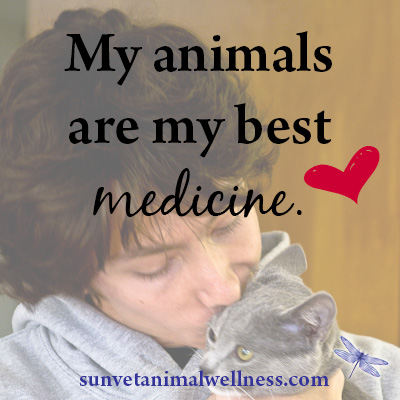Dr. Laurel Davis, Asheville’s integrative vet, offers “Stories from a Holistic Veterinarian”, the blog of a holistic vet and “animal interpreter.” With a clinic in downtown Asheville, NC. Dr. Laurel also offers animal health, lifestyle and vaccination advice for cats, dogs and their human friends across the country.
Have a question for Dr. Laurel? Send it in.Want comprehensive or detailed dog or cat advice? Schedule an Ask Dr. Laurel™ phone or Skype consultation.
Make it a Healthy Spring, Pt 1: Holistic prevention for cat and dog allergies
>View the second article in the Make It a Healthy Spring series, covering flea prevention.
Here comes Spring! As the weather warms up in Asheville and throughout the States, many of my clients find themselves with loads of questions regarding seasonal health concerns for their furry friends, so I have decided to address a few of those concerns in my next few blog posts. This week focuses on allergies, and the next two posts will address flea and heartworm prevention. To ensure that you don’t miss a trick (or a post), stay in touch by signing up for our our email list in the right sidebar.
How do I tell if my animal companion has seasonal allergies?
Some animals live inside, but for those who don’t, having an enforced imprisonment because of their allergies is no fun at all. Your animal friends are not so different from their people with the symptoms they show. They may sneeze and get more goo in their eyes, or they may be sleepier. The most common symptom I see in cats and dogs, which is not so common in their humans, is scratching, chewing, and licking on various areas of their bodies. As the pollen begins to fly, inhalant allergies ramp up. In dogs and cats, pollen primarily affects them by making them itchy. Of course, there are other causes of itchy animals including food allergies, flea bite allergies, the shedding of their winter coat, mosquito and other bug bites, and occasionally, contact dermatitis such as that caused by poison ivy. Your animal friend’s itches can be caused by a combination of any of these.
Why is it important to treat my animal companion’s allergies?
It is important to diagnose and treat allergies in your dog or cat because of the discomfort and symptomatic health issues they can cause. Fortunately, holistic medicine offers a variety of preventatives and treatments for your dog’s or cat’s seasonal allergies, ranging from homeopathics to herbal treatments. Since there are so many nuances, treatment is not standard for spring allergies. For each animal I see, I observe them closely and connect with them to ensure the most accurate diagnosis and treatments and lifestyle changes customized just for them.
As the weather warms and the mountains and land grow greener, some new concerns arise for your beloved companions, but the warm weather also affords you more opportunities to connect with them and their needs. Now is the time to schedule a check-up to learn the best preventions and treatments for your individual animal, then enjoy the blossoming going on around you, and get feisty with your fuzzy friend!
Keep an eye out for my next two posts in this Make it a Healthy Spring series. Next week, everyone’s favorite subject: FLEAS! After that, I’ll talk about mosquitos and how to prevent their resulting heartworms.
Shine on,
>View the second article in the Make It a Healthy Spring series, covering flea prevention.
Dr. Laurel Davis is Asheville’s integrative vet, offering phone and Skype consultations for animal lovers everywhere. Call 828-254-2221 or order an Ask Dr. Laurel™ phone or Skype session or bring your dog or cat to her downtown Asheville, NC clinic. Read more patient stories.
Get to know Dr. Laurel by reading her blog.
Do you have a story about how Dr. Laurel helped your dog or cat? Please post your comment on our Facebook page or write a Google Review.



